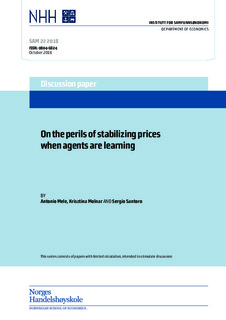| dc.description.abstract | The main advantage of price level stabilization compared with in
ation stabilization
rests on the central bank's ability to shape expectations. We show that stabilizing
prices is no longer optimal when the central bank can shape expectations of agents
with incomplete knowledge, who have to learn about the policy implemented. Disin-
ating in the short run more than agents expect generates short-term gains without triggering an abrupt loss of confidence, because agents update expectations sluggishly. Following this policy, in the long run, the central bank loses the ability to shape agents' beliefs, and the economy converges to a rational expectations equilibrium in which policy does not stabilize prices, economic volatility is high, and agents suffer the corresponding welfare losses. However, these losses are outweighed by short-term gains from the learning phase. | nb_NO |
